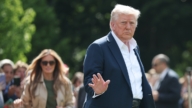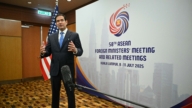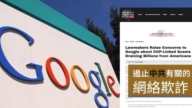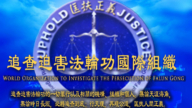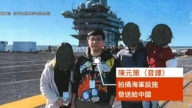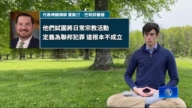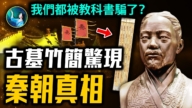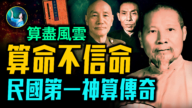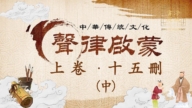【新唐人2013年06月11日讯】美国总统欧巴马和中共国家主席习近平,上周六,结束了两天的非正式会议。虽然他们在施压北韩的核野心,以及解决气候变化问题上,向前迈进了一步,但是,在网络间谍活动等争议问题上,仍然有着严重分歧。专家分析说,奥、习两人表面上相谈甚欢,但两国的根本战略和政策方针,正在走向冲突。
中共中央党校《学习时报》副编审邓聿文表示,美、中领袖会面,双方表面都客客气气,因为,会谈以务虚为主。
中共中央党校《学习时报》副编审邓聿文:“两国领导人的会谈它是务虚的成分多,务实的成分少,主要是建立一种所谓的私人关系,以及对各自领导人执政风格的一个认知,还有对未来两国发展原则性的东西进行确认。”
美国《纽约时报》报导,最近一段时间最受争议的问题,就是,美国指控中国公司曾盗窃美方军事和经济秘密,以及网络空间财产,而且这些中国公司和中共军方互有联系。报导说,这个话题主导了双方的会晤,但双方官员似乎无法达成共识,以习近平未明确承认指控而结束话题。
欧巴马和习近平都公开表示,希望建立伙伴关系,但美国国家安全顾问汤姆•多尼隆(Tom Donilon)警告说,来自中共的威胁,可能会对这种合作的精神构成制约。
多尼隆说,欧巴马曾警告过,如果黑客入侵继续发生,“将成为双方经济关系中的难题”。
美国纽约城市大学政治学教授夏明:“应该说中美关系在走低,是在往恶化的方向走。而且这种恶化不仅仅是领导人层面,更大的是在经济领域里面,还有更大是在民众相互的认知,就是对相互的好感上也在恶化。所以我觉得美国智库的成员也希望中、美关系这次有点像征性的进步,尤其能够建立起有理想性的、有前瞻性的、以公报形式来表示中美关系的。这种会谈结果显然没有达到。”
夏明表示,美、中两国领袖这次会谈本身,只是一种接触性的。在面对矛盾加深的情况下,美、中两国领导人把酒言欢作秀,只是为了公关需要。
夏明:“不同的领导人能够营造出一种比较积极的气氛,或者在个人层面上来说还能够有一定的融洽,但是我觉得中、美目前根本大的战略,态势和根本的政策方针,现在是在走向一种冲突。”
夏明认为,中共政府在内政上搞收紧、和强化专制的许多做法,会使得美国对中国的批评声音加剧。
夏明:“我们可以看到,中国国内的人权状况是在恶化。从中共上层来看,他们在意识形态方面全面抛弃普世价值,敌视公民社会,同时现在又在发起进攻,对民主体制和宪政体制进行抛弃和围攻。我觉得这一点是对美国的基本的立国的那些价值观和意识形态核心价值发起进攻,这一点也会引起美国对中共的许多反感。”
欧巴马和习近平周五晚上,已就北韩问题进行长时间会谈。多尼隆表示,“他们同意北韩必须要无核化,双方都不能接受北韩拥有核武器”,并且,中、美两国将共同努力,通过向平壤施压实现这一目标。
邓聿文认为,在朝鲜问题上,如果中、美两国达成协议,对朝鲜有一个一致的态度的话,对于解决朝鲜问题,当然有帮助。他认为,习近平上台之后,中、美两国在朝鲜问题上的立场,比过去显然更加接近。
邓聿文:“变化它是一个过程。一下子来个180度大转弯,当然不可能。但是相对来说(对北韩)比过去更严厉。在无核化问题上,肯定既是姿态也是实际内容。”
《纽时》报导,美国官员表示,习近平对它的长期盟友—-北韩,正在逐渐失去耐心。这使得美国政府与中方展开新合作的希望,有所提高。
采访编辑秦雪 后制李月
While Obama and Xi Put on a Show, China and the US make Strategic Moves
Jinping finished a two-day informal meeting last Saturday.
Although they moved a step forward on pressuring
North Korea’s nuclear ambitions and addressing climate change,
there are serious differences in other controversial issues
such as recent cyber attacks.
Experts analyzed that superficially
Xi and Obama had a happy discussion,
but the two countries’ fundamental strategic and
policy guidelines are moving toward conflict.
Den Yuwen, deputy editor of Chinese Communist Party (CCP)
Central Party School’s Study Times says
U.S. and Chinese leaders both showed courtesy,
as the discussions have no solid results.
Den Yuwen, deputy editor at the CCP Central Party School:
“So far, the talk between the two leaders seems more superficial than practical.
They mainly wanted to establish a personal relationship,
to get to know each other’s governing style,
and confirm future development principles of
the two nations.”
The New York Times reported on the recent
controversial issue of accusations that
Chinese corporations have stolen U.S. military and
economic property and secrets in cyberspace.
These Chinese companies are known to
have connections with China’s military.
The article says this topic dominated the presidents’ meeting,
but officials on either side were unable to reach a consensus,
and the meeting concluded without Xi’s
explicitly admitting the allegations.
Obama and Xi Jinping have publicly expressed the
hope to build a partnership.
But the U.S. National Security Adviser Tom Donilon
warned that threats from the CCP might pose constraints to the spirit of cooperation.
Donilon said Obama warned that if the hacking continued,
it would be a “difficult problem in the economic relationship."
New York City University political science professor Xia Ming:
“It should be said that U.S.-Sino relations are deteriorating.
Not only on the level of leaders,
but also in the greater the economic sphere,
as well as the mutual understanding among people.
The mutual goodwill is deteriorating.
I think U.S. think-tanks also hope U.S.-Sino relations
will make some progress this time. And in particular, that relations can be established
based on ideals, foresightedness and openness.
Such results were clearly not achieved."
Xia says the meeting between the two leaders
was just an introductory meeting.
Facing intensifying conflicts, the two leaders
put up a show just for public relations needs.
Professor Xia Ming: “Different leaders can create a more
positive atmosphere, or some agreement on a personal level.
I think in the U.S. and China’s major strategic, situational
and fundamental policies are moving towards conflict."
Xia believes the CCP government’s tightening up
and strengthening of authoritarian rule in China
will only intensify the U.S.’ criticism on China.
Xia Ming: “We can see that China’s domestic
human rights situation is deteriorating.
The ideology of high-level CCP leadership
fully abandons comprehensive universal values,
holds hostile attitudes toward civil societies, and attacks
the democratic institutions and constitutional system.
I think this is an attack on American values
and founding principles.
This also leads many Americans
to be disgusted by the CCP."
On Friday night, Obama and Xi Jinping held
long talks on the issue of North Korea.
Donilon said “They agreed that North Korea
has to denuclearize;
that neither country will accept North Korea
as a nuclear-armed state.”
The U.S. and China will work together to put pressure
on Pyongyang to achieve this goal.
Deng Yuwen believes that if U.S. and China can agree
to have a consistent attitude towards North Korea,
it would for sure help resolve the issue.
In his view, since Xi’s gaining power, the stance of the U.S.
and China on North Korea are clearly closer than in the past.
Den Yuwen: “Change is a process.
It’s impossible to make a complete change all at once.
But relatively speaking, [China] is taking a more serious
stance on North Korea than before.
While China is trying to use the denuclearization
to show it’s position, it’s also a practical issue for them.”
According to New York Times, U.S. officials say Xi is slowly
losing patience with its long-term friend – North Korea.
This has increased hope that the U.S. government to
launch a new co-operation with China.


